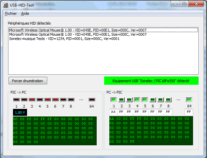USB HID Test

In the book "PIC microcontrollers for beginners" published by Elektor is to present how to dialogue through the USB port in HID mode. The source of the Windows executable is written under Delphi 7. Delphi 7 is no longer installable on new versions of Delphi. The project is to rewrite the project under Lazarus (freeware) to make the project usable by everyone.
The source of the Windows executable is written under Delphi 7. Delphi 7 is no longer installable on newer versions of Windows starting from XP.
The author thought it would be nice to communicate the source but still it may be usable. The source analyzed, there appears non-free third party components requiring a financial expense to be able to use them.
This means that the source is unusable for those who wish to learn USB dialogue in HID mode for their future personal achievements. On the other hand, the delivered compiled version works.
The project is to rewrite the software under Lazarus (freeware and OpenSource) to make the project usable by all and under all operating environments (OS).
So the first step is to create the multi-environment code under Lazarus and the second step is also to make the firmware code free under the J.A.L. (Just Anotheur Language) compiler for PIC.
Not being a programmer born with Lazarus, I stumble on the method for :
- to make the hard USB insert be recognized,
- to make the elevation of the hard USB recognized,
- dialog to get the hard drive's data entered,
- dialog to get the data out to the hard drive.
Although the source found for dialog to USB on Lazarus is based on the source of the Delphi JVCLHIDInterface component, it is not used identically for attempting to reuse the author's code.
I appeal to the good will of Elektor's developers and the participating readers in this lab to help me to complete this development.
To do so, I'm providing you with some links from the original project as well as links to continue my work already done (I've cleaned up the code from my unsuccessful research) with Lazarus 2.0.10 (https://www.lazarus-ide.org/) :
- The author's source project can be downloaded here https://www.sonelec-musique.com/logiciels_freewares_usbhidtest.html,
- The third party component of the USB dialog for Lazarus can be found here: https://github.com/LongDirtyAnimAlf/FPC-USB-HID with a thread on its use here: https://forum.lazarus.freepascal.org/index.php/topic,49233.0.html
- The source of the PIC 18f4550 firmware can be downloaded from the examples provided in the book. It compiles with MikroPascal for Pic from MikroElectronica . : https://www.elektor.fr/amfile/file/download/file/93/product/4682/
François
------------------------------------------------------------------------------------------------------
Dans l'ouvrage "Les microcontrôleurs PIC pour les débutants" publié par Elektor (https://www.elektor.fr/les-microcontroleurs-pic-pour-les-debutants) est présenter comment dialoguer par le port USB en mode HID.
Le source de l'exécutable Windows est écrit sous Delphi 7. Delphi 7 n'est plus installable sur les nouvelles versions de Windows à compter de XP.
L'auteur a estimé être agréable en communiquant le source mais quand bien même il peut être exploitable. Le source analysé, il y apparaît des composants tiers non libre nécessitant une dépense financière pour permettre leur emploi.
Ce qui veut dire que le source est inexploitable pour celui qui souhaite s'initier au dialogue USB en mode HID pour ses futures réalisations personnelles. Par contre, la version livrée compilée fonctionne.
Le projet est de ré-écrire le logiciel sous Lazarus (freeware et OpenSource) pour rendre le projet utilisable par tous et sous tous les environnements d'exploitation (OS).
La première étape est donc de créer le code multi-environnements sous Lazarus et la seconde étape est également de rendre le code du firmware libre sous le compilateur J.A.L. (Just Anotheur Language) pour PIC.
N'étant pas un programmeur né avec Lazarus, je bute sur la méthode pour :
- faire reconnaître l'insertion du hard USB,
- faire reconnaître l'elevement du hard USB,
- dialoguer pour faire entrer les données du hard,
- dialoguer pour faire sortir les données vers le hard.
Bien que le source trouvé pour dialoguer en USB sous Lazarus s'appuie sur le source du composant Delphi JVCLHIDInterface, il ne s'utilise pas à l'identique pour avoir tenté de réutiliser le code de l'auteur.
Je fais appel à la bonne volonté des développeurs d'Elektor et des lecteurs participants à ce labo pour m'aider à mener à bien ce développement.
Pour ce faire, je vous mets à dispositions quelques liens du projet d'origine ainsi que des liens pour poursuivre mon travail déjà effectué (j'ai nettoyé le code de mes recherches infructueuses) avec Lazarus 2.0.10 (https://www.lazarus-ide.org/) :
- Le projet source de l'auteur est téléchargeable ici https://www.sonelec-musique.com/logiciels_freewares_usbhidtest.html,
- Le composant tiers du dialogue USB pour Lazarus se trouve ici : https://github.com/LongDirtyAnimAlf/FPC-USB-HID avec un fil sur son utilisation ici : https://forum.lazarus.freepascal.org/index.php/topic,49233.0.html
- Le source du firmware du PIC 18f4550 se télécharge dans les exemples fournis du livre. Il se compile avec MikroPascal pour Pic de MikroElectronica . : https://www.elektor.fr/amfile/file/download/file/93/product/4682/
François



Mises à jour de l'auteur